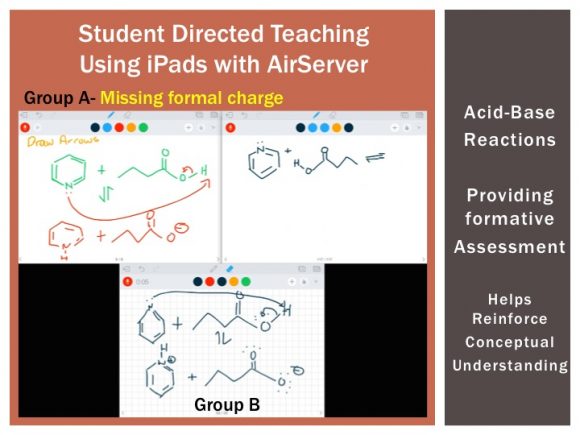Traditional methods of teaching organic chemistry via lecture do not provide active learning opportunities for students. To alleviate passivity and break the monotony of lectures, clickers have gained popularity in large enrollment lecture courses. Clicker questions provide instructors with a means of getting immediate feedback from students. However, these are often limited to multiple-choice questions.
Meaningful learning occurs when students are encouraged to participate and work on problems rather than waiting to copy instructors’ answers. Finding ways to engage students in stepwise problem-solving exercises remains a major challenge in teaching organic chemistry. We report how the use of “iPad with AirServer” in an organic chemistry lecture course can make student thinking visible. The wireless mirroring feature using AirServer was used to project students’ in-class work from iPads to a projector during class. This technique enhances student engagement by encouraging them to work in small groups and by fostering vibrant discussions. Students work with their peers (with guided instruction from peer teaching assistants and the instructor). While attempting to solve the problems, students also engage in self-assessment. Misconceptions that students have are revealed and formative assessments are provided to the entire class. These efforts facilitated the identification of common cognitive biases and emotional traps that hinder critical thinking, and they provided a meaningful student-centered learning environment and helped increase student motivation.
Molecular visualization and the Educreations app were used for several different types of organic chemistry lecture problems, for example: drawing Lewis dot structures, naming functional groups, drawing line structures, conformers, resonance, reaction products, reaction mechanisms, and retrosynthetic analysis. Screenshots of student work document several ways in which iPad with AirServer were employed and shed light on areas students struggle with.
This work was possible because of the Hunter FITT-2014 grant and support of ICIT staff.
Join us on Tuesday, Nov 1, 2016 during an ACERT luncheon to learn more about the advantages and challenges in using this teaching pedagogy.
This work was presented at the March 2016 American Chemical Society Boston-Symposium on e-learning. The panel was entitled, “The proliferation of personal mobile computing devices including iPads, iPods, smart-phones, clickers, cell phones used as clicker devices, wireless probes for lab data collection afford an opportunity for educational engagement – or perhaps distraction?”




Comments are closed.